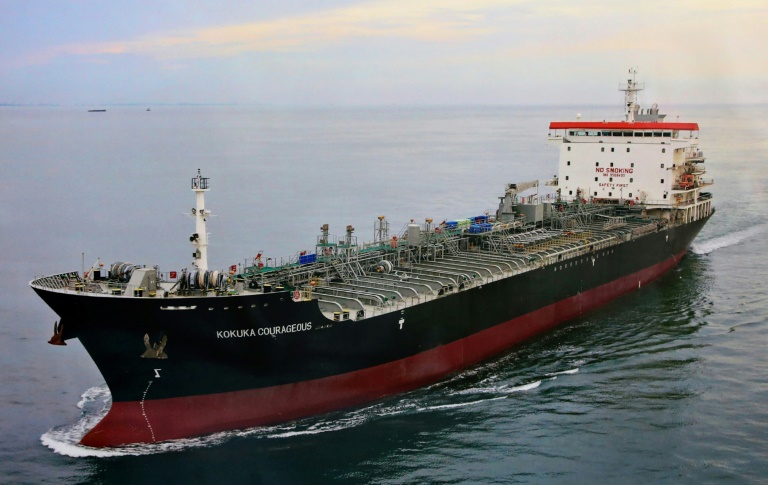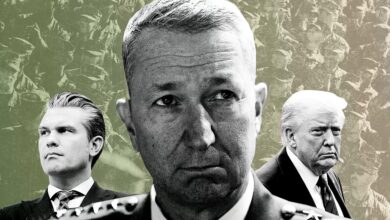
Two damaged tankers arrived safely Sunday at locations off the Emirati coast after they were rocked by explosions in Gulf waters, in an incident Saudi Arabia blamed on its regional arch-rival Iran.
The Japanese-owned Kokuka Courageous was carrying highly flammable methanol through the Gulf of Oman on Thursday when it came under attack along with the Norwegian-operated Front Altair — the second assault in a month in the strategic shipping lane.
US President Donald Trump has said the operation had Iran “written all over it” — rejecting Tehran’s vehement denial — and Washington’s key Gulf ally Saudi Arabia has also lashed out against Tehran.
In his first public comments since the attacks, Saudi Crown Prince Mohammed bin Salman said in remarks published Sunday that he would not hesitate to tackle any threats to the oil-rich kingdom.
“We do not want a war in the region… But we won’t hesitate to deal with any threat to our people, our sovereignty, our territorial integrity and our vital interests,” he told pan-Arab daily Asharq al-Awsat.
He said Iran had responded to a visit to Tehran by Japan’s Prime Minister Shinzo Abe “by attacking two tankers, one of which was Japanese”.
Abe had been on an unprecedented visit to the Iranian capital in a bid to defuse tensions between Washington and the Islamic republic when the attacks took place.
The US military on Friday released grainy footage it said showed an Iranian patrol boat removing an “unexploded limpet mine” from the Japanese vessel.
On Sunday, it said Iran had unsuccessfully tried to shoot down a US drone on a surveillance mission following the attack on the Kokuka Courageous.
The vessel’s Singapore-based BSM Ship Management said in a statement Sunday that it had “arrived safely at the designated anchorage” and that its crew were “safe and well”.
Vital waterway
 AFP / Jean-Michel CORNU The strategic Strait of Hormuz
AFP / Jean-Michel CORNU The strategic Strait of HormuzThe other ship, the Front Altair, was under safe tow by tug boats towards an area off the coast of the eastern Emirati port of Fujairah.
“First inspections are under way and no hot spots have been identified following the fire,” while all crew members were in Dubai, the vessel’s owners said in a statement Sunday.
Russia on Sunday warned against making “baseless accusations” over the attacks.
“Such incidents can undermine the foundations of the world economy,” said Kremlin spokesman Dmitri Peskov.
Thursday’s attacks took place southeast of the Strait of Hormuz, a vital corridor connecting the energy-rich states of the Middle East to the global market.
Iran, which is struggling with crippling US sanctions, has repeatedly warned in the past that it could block the strait in a relatively low-tech, high-impact countermeasure to any attack by the United States.
Secretary of State Mike Pompeo on Sunday vowed the US would ensure the strait remains open, without detailing what options Washington is considering to protect shipping.
“What you should assume is we are going to guarantee freedom of navigation throughout the strait,” he said in a Fox News television interview.
Earlier Sunday, Iran’s parliament speaker said that Washington could have been behind the “suspicious” tanker attacks, the official news agency IRNA reported.
The attacks “seem to complement the economic sanctions against Iran, considering that (the US) has not achieved any results from them”, he told lawmakers.
‘Iran and its proxies’
 AFP / GIUSEPPE CACACE Attacks on tankers in the Gulf have sparked calls for world powers to secure navigation in the strategic Gulf
AFP / GIUSEPPE CACACE Attacks on tankers in the Gulf have sparked calls for world powers to secure navigation in the strategic GulfThe Saudi crown prince also accused “Iran and its proxies” over May 12 attacks on four tankers anchored in the Gulf of Oman off the UAE port of Fujairah.
Attacks on Saudi Arabia by Iran-aligned Yemeni rebels have further fuelled tensions in the region.
On Friday, the kingdom intercepted five drones launched by the Huthi rebels, a Riyadh-led coalition said, in a second assault on an airport in the country’s southwest in two days.
The drones targeted Abha airport, where a rebel missile on Wednesday left 26 civilians wounded, and the nearby city of Khamis Mushait, which houses a major airbase, the coalition said.
A Yemeni rebel drone targeting Abha was also intercepted Saturday, but it caused no casualties or damage.
The US military said in its statement Sunday that one of its drones was shot down over Yemen by Huthi rebels on June 6.
The rebels, who have faced persistent coalition bombing since March 2015 that has exacted a heavy civilian death toll, have stepped up attacks across the border in recent weeks.
Prince Mohammed said Saudi Arabia would “not accept the presence of militias on its borders”.
Riyadh has repeatedly accused Tehran of arming the rebels with sophisticated weapons, a charge the Islamic republic denies.




